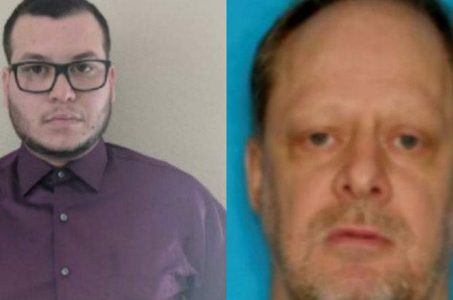Las Vegas Police Say First Officer in Gunman Stephen Paddock’s Suite Failed to Activate Body Camera
Posted on: May 2, 2018, 02:00h.
Last updated on: May 2, 2018, 11:45h.
Las Vegas police are being forced to publicly release new documents and video footage of its October 1 response to the Mandalay Bay shooting that left 58 dead.

But ahead of the disclosure, Clark County Sheriff Joe Lombardo told the media that the first officer to enter gunman Stephen Paddock’s hotel suite failed to activate his body camera.
Lombardo says the video footage released Wednesday of the Mandalay Bay room comes from the second and third arriving officers.
“What is seen on those videos in no way changes the facts that we were able to clarify for you shortly after the crime,” Lombardo said at a Tuesday press conference.
The sheriff didn’t take questions, nor provide reason as to why Levi Hancock, the first Metro Police officer to arrive at the 32nd floor suite, didn’t turn on his camera. The failure to do so, however, might give additional fodder to conspiracists who continue to question the horrific events of October 1.
Law enforcement have still not uncovered, or at least disclosed, a motive for Paddock’s actions. The Nevada Supreme Court ordered Metro Police to release body camera footage and 911 audio.
Lack of Transparency
It’s been more than seven months since Paddock opened fire from his Mandalay Bay suite onto an outdoor country music festival across the Strip below. And many questions that emerged in the days and weeks following the deadliest massacre in modern US history continue to go unanswered.
Lombardo argued that his agency’s attempts to conceal investigative materials have been in the best interest of his staff and the general public.
During Tuesday’s statement, the sheriff said preparing such releases means pulling personnel away from their primary police work. He also said putting out surveillance video to the public will cause people to relive the horror and cause new emotional distress.
“We have always tried to protect the victims and their families of this incident,” Lombardo said. “Further victimization is certain to occur, and it is something we wanted to avoid.”
The Las Vegas Review-Journal, one of several media outlets that brought lawsuits against Metro to disclose investigative materials, isn’t buying Lombardo’s excuses.
“Transparency is not a burden for government agencies,” RJ Executive Editor Glenn Cook declared. “It is a legal obligation that is essential to the preservation of the public’s trust.”
“All we’ve ever asked Metro to do is follow the letter of the Nevada Public Records Act, which makes clear that taxpayer-funded body camera footage, 911 recordings and other records can be reviewed by the public,” Cook concluded.
No Conspiracy
Las Vegas police, the FBI, and MGM Resorts, parent company to Mandalay Bay, assert that no party is trying to hide anything from the public. In March, MGM released Mandalay surveillance video of Paddock’s actions in the days leading up to the shooting to show that he acted “normal.”
Lombardo says the body cam footage will be released over the next several weeks, and “for that reason, we caution you from making conclusions based on any single release.”
Related News Articles
Most Popular
Mirage Las Vegas Demolition to Start Next Week, Atrium a Goner
Where All the Mirage Relics Will Go
Most Commented
-
Bally’s Facing Five Months of Daily Demolition for Chicago Casino
— June 18, 2024 — 12 Comments
















Last Comments ( 2 )
Why no video of Paddock putting the bracket on the door? Because Paddock did not put the bracket on the door. If he had, the video would be pasted on every newspaper, every news station broadcast and would be the only thing tying him to this event. None of the weapons in his room have been ballistically linked to the rounds in the victims. That is unbelievable. And they still blame him? Such complete and utter nonsense has been bought hook line and dinker by the public. Every video in their possession should be made available to the public. We know what to look for. We will show the inconsistency throughout the investigation, the lack of true determination to find and disclose the truth in this matter. We have been and are still being lied to by our govt. It was a coordinated attack. It was a military grade plan of attack. Saudis? Maybe. Our military or agency trained person's? Maybe. Reason? To get rid of our 2nd amendment. False flag incentive to grab our guns.
Lombardo is a liar. His officers are heard being told to turn off their cams before breaching the room The officers who left theirs on disobeyed orders, or, forgot to turn them off. They refuse to provide most of the videos because they do not want the public to see that shots came from different directions, or hear people saying that shots came from helicopters, or hear the sounds of shots coming from different distances, some loud as jackhammers and some sounding very remote. There is also the issue of automatic gunfire after midnight and various hotels. Paddock was an arms delivery guy working for an alphabet agency. He was killed before the shootings started.